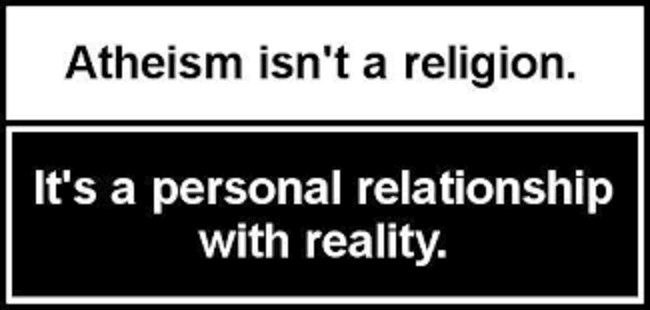Bertrand Russell was a British philosopher, logician, mathematician, historian, writer, social critic, political activist and Nobel laureate. He was one of the most important and recognizable public figures in the English-speaking world during the first half of the twentieth century. He was also an avowed atheist. The story is told that at the end of one of his public lectures in which his atheism was on full display, a furious woman stood up during the question and answer period and asked, “And Lord Russell, what will you say when you stand in front of the throne of God on judgment day?” Russell replied, “I will say: ‘I’m terribly sorry, but you didn’t give us enough evidence.’”

I was reminded of this story when the author of an article I assigned in my ethics classes last semester included it at the beginning of his discussion of how people use evidence to support the different sorts of things we claim to be true. For instance, the author claimed, verifiable and objective evidence serves as the foundation for truth claims in the sciences, but in religious belief—no so much. Indeed, the author continued, religious belief is easy and available to everyone because evidence is not required—just faith (whatever that means). The author identifies himself as an atheist who is fascinated by the phenomenon of religious belief—his conclusions make me wonder if he has ever actually met a person of faith.
As I worked with fifty students in two sections of General Ethics through our unit entitled “Does God have anything to do with ethics?’ I found that my junior and senior students—the majority of whom are products of Catholic primary and secondary education—were no more informed about the relationship of evidence to faith than the atheist author of the article for this given day. A few weeks earlier I had provided them with my “go to” definition of faith: Faith is the substance of things hoped for, the evidence of things not seen. Some were surprised to learn that this definition, which does not refer to either God or religion, is from the Book of Hebrews in the New Testament. Whatever else faith is, the author of Hebrews is claiming that evidence has something to do with it.
I decided, as I often do, to get at this tricky issue obliquely and through the back door. “How many of you have ever been to Japan?” I asked. No hands went up in either class section, including mine. “How many of you believe in the existence of Japan?” I asked next—all hands went up. “How does that work?” How do we come to believe in the existence and/or truth of something when we lack direct supporting evidence? Because clearly the preponderance of things that each of us believes to be true—thousands upon thousands of items of all sorts—are beliefs that lack direct empirical evidence to support them.“How many of you believe that Abraham Lincoln was assassinated by John Wilkes Booth in Ford’s Theater in 1865?” I asked next. All hands went up. “How many of you were there when it happened?” No hands went up—I assured them that even I was not old enough to have been an eye-witness. So once again we have an example of a claim that everyone believes to be true even though we lack “concrete evidence” (as my students like to call it) to support our belief. Or do we?
Upon being asked to list what sorts of evidence we do have to support our beliefs concerning the existence of Japan and what happened in Ford’s Theater in April of 1865, my students came up with several suggestions:
- Testimony—The word of others, eyewitnesses when possible, counts as particularly strong indirect evidence. Even though I have not been to Japan, I know people who have visited there and have even met people from Japan. It is, of course, possible that all of these people are lying to me, but the more that the testimonies I gather are consistent with each other, the more likely it is that they are pointing toward something true. This doesn’t work, of course, when considering events where no eyewitnesses are available, such as what happened at Ford’s Theater, but fortunately the spoken word is not the only way in which we are able to gather relevant testimony.
- Texts—Those who have not been to Japan have seen pictures of it and have read descriptions of it. These are indirect and second-hand, but become part of accumulating indirect evidence. Textual evidence for historical events for whom there are no longer any eyewitnesses is the bread-and-butter of the historian’s trade.
 The great Doris Kearns Goodwin gave a talk on campus not long ago—when she spoke of Abraham Lincoln, it never occurred to me to wonder if what she was saying was true. As she described the meticulous ways in which she gathered evidence for her book Team of Rivals from letters, diaries, newspapers, and other first-hand accounts from over a century-and-a-half ago, I was reminded of how the only evidence we have of the truth of anything occurring more than a hundred years ago requires both investigative strategies and an inherent trust in the results of such investigations.
The great Doris Kearns Goodwin gave a talk on campus not long ago—when she spoke of Abraham Lincoln, it never occurred to me to wonder if what she was saying was true. As she described the meticulous ways in which she gathered evidence for her book Team of Rivals from letters, diaries, newspapers, and other first-hand accounts from over a century-and-a-half ago, I was reminded of how the only evidence we have of the truth of anything occurring more than a hundred years ago requires both investigative strategies and an inherent trust in the results of such investigations. - Traditions—Often all we have to rely on to bolster various beliefs is what has been passed down from generation to generation as stories and traditions intended to capture the essence of an individual, a family, or a culture. We use such stories and traditions as evidence to support our best guesses concerning what might have happened; they form an important part of the foundation of belief that gets passed from generation to generation.
It was clear as the discussion proceeded that in some of the most important parts of our daily lives, both as we engage with the present and as we consider the past, our “certainties” are built on a foundation of uncertainty, a foundation that we eventually depend upon as if it were certain as our collection of indirect evidence reaches an imaginary tipping point.
I stepped back from the board where I had listed their examples of indirect evidence and asked, “How might these types of evidence work in another area of belief where we have a difficult time accessing direct evidence—belief in God?” As it turns out, the same sorts of indirect evidence that we use on a daily basis to bolster our belief in all kinds of things are available when we enter the arena of faith.
Sacred texts are used as sources of evidence of all sorts; regardless of whether a person considers such texts to be divinely inspired or not, they contain evidence of how people have engaged with issues of God and faith over the centuries. Such texts purportedly contain testimonial evidence to the existence and nature of God as the divine reportedly interacts with human beings, and interpretations of these testimonies become centerpieces of traditions that develop into religions.
We also have the same sort of indirect testimony concerning faith-related issues that my students used when identifying the sources of their belief in the existence of Japan even though none had ever been there. For instance, I know many people who report personal experiences that they believe can only be explained by an invasion of or intervention into their life by something greater than themselves. Often such reports can also be accounted for by explanations other than a direct encounter with God, but in such cases one must always consider both the reliability of the person giving the testimony and whether other similar reports have been given by other reliable sources.
As always, whether or not a person believes such reports is going to be a direct function of her or his predisposition to believe anything. How much evidence is enough? What sorts of testimony will I never believe, no matter who it comes from? To claim that evidence is ever free of all sorts of psychological and personality-driven biases is to ignore how we actually gather and use evidence in real time.
My answer to Bertrand Russell’s complaint that “you didn’t us give enough evidence” is that perhaps Lord Russell needed to consider what sort of evidence would have counted as “enough,” as well as what even counted as evidence for him at all. If his claim is that there is not enough “concrete evidence” to establish the existence of God, I might agree. But I would remind Russell that the vast majority of the many things that we believe to be true are not supported by such evidence either. When considering issues as important as faith, there is no need to change the rules of the evidence game—faith is, after all, “the evidence of things not seen.”













